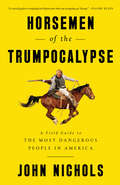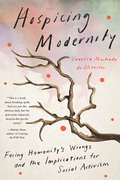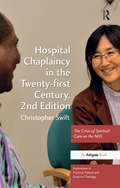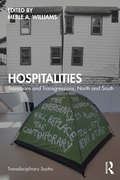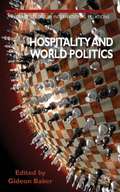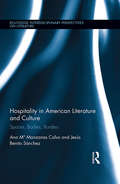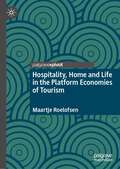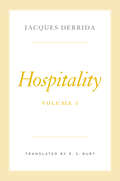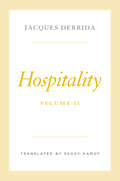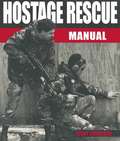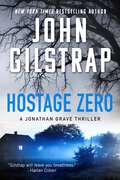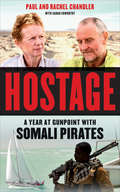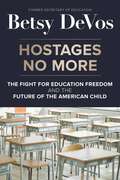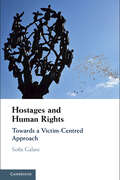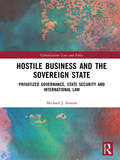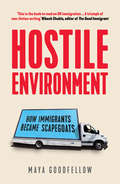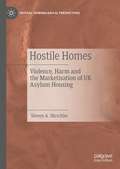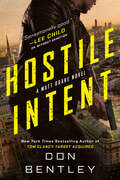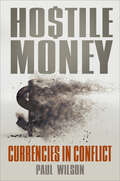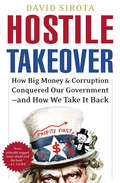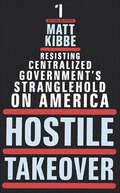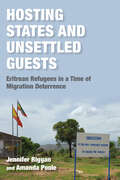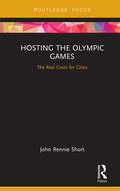- Table View
- List View
Horsemen of the Trumpocalypse: All You Need To Know About The Most Dangerous People In America
by John NicholsA line-up of the dirty dealers and defenders of the indefensible who are definitely not "making America great again"Donald Trump has assembled a rogue's gallery of alt-right hatemongers, crony capitalists, immigrant bashers, and climate-change deniers to run the American government. To survive the next four years, we the people need to know whose hands are on the levers of power. And we need to know how to challenge their abuses. John Nichols, veteran political correspondent at the Nation, has been covering many of these deplorables for decades. Sticking to the hard facts and unafraid to dig deep into the histories and ideologies of the people who make up Trump's inner circle, Nichols delivers a clear-eyed and complete guide to this wrecking-crew administration.
Hosni Mubarak and the Future of Democracy in Egypt
by Alaa Al-Din ArafatThe Egyptian revolution of 2011 captivated the world and served as the focal point of the regional uprisings that have collectively come to be known as the Arab Spring. Even now the world waits to see whether the country's elections will aid the progress of liberal democracy or resurgent Islamism. In this essential study, Egyptian scholar Alaa Al-Din Arafat provides a comprehensive look at the political, diplomatic, religious, and socioeconomic factors that were at play in the time leading up to the protests that led to the ouster of Hosni Mubarak. This edition includes a new foreword that reflects on the developments of the last year, providing valuable new context and exploring possible future outcomes.
Hospicing Modernity: Facing Humanity's Wrongs and the Implications for Social Activism
by Vanessa Machado de OliveiraFor fans of Everything Is F*cked and Against Purity: Living Ethically in Compromised Times, a book about facing the multiple crises of modernity--and hospicing modernity--with maturity, humility, and integrity.This book is not easy: it contains no quick-fix plan for a better, brighter tomorrow, and gives no ready-made answers. Instead, Vanessa Machado de Oliveira presents us with a challenge: to grow up, step up, and show up for ourselves, our communities, and the living Earth, and to interrupt the modern behavior patterns that are killing the planet we&’re part of. Driven by expansion, colonialism, and resource extraction and propelled by neoliberalism and rabid consumption, our world is profoundly out of balance. We take more than we give; we inoculate ourselves in positive self-regard while continuing to make harmful choices; we wreak irreparable havoc on the ecosystems, habitats, and beings with whom we share our planet. But instead of drowning in hopelessness, how can we learn to face our reality with humility and accountability? Machado de Oliveira breaks down archetypes of cognitive dissonance--the do-gooder who does "good enough," then retreats to business as usual; the incognito capitalist who, at first glance, may seem like a radical change-maker--and asks us to dig deeper and exist differently. She explains how our habits, behaviors, and belief systems hold us back...and why it's time now to gradually disinvest. Including exercises used with teachers, NGO practitioners, and global changemakers, she offers us thought experiments that ask us to: • Reimagine how we learn, unlearn, and respond to crisis• Better assess our surroundings and interact with difference, uncertainty, complexity, and failure• Expand our capacity to hold personal and collective space for difficult and painful things• Understand the "5 modern-colonial e's": Entitlements, Exceptionalism, Exaltation, Emancipation, and Enmeshment in low-intensity struggle activism• Interrupt our satisfaction with modern-colonial desires that cause harm• Create space for change driven neither by desperate hope nor a fear of desolate hopelessness For fans of adrienne maree brown, Sherri Mitchell, and Arundhati Roy, Hospicing Modernity challenges our assumptions and dares to ask more of us, for the sake of us all.
Hospital Chaplaincy in the Twenty-first Century: The Crisis of Spiritual Care on the NHS (Explorations in Practical, Pastoral and Empirical Theology)
by Christopher SwiftThe place of religion in public life continues to be a much-debated topic in Western nations. This book charts the changing role of hospital chaplains and examines through detailed case studies the realities of practice and the political debates which either threaten or sustain the service. This second edition includes a new introduction and updated material throughout to present fresh insights and research about chaplaincy, including in relation to New Atheism and the developing debate about secularism and religion in public life. Swift concludes that chaplains must do more to communicate the value of what they bring to the bedside.
Hospitalities: Transitions and Transgressions, North and South
by Merle A. WilliamsThis collection of imaginative essays traces notions of hospitality across a sequence of theoretical permutations, not only as an urgent challenge for our conflicted present, but also as foundational for ethics and resonant within the play of language. The plural form of the title highlights the inter-implication of hospitality with its exclusive others, holding suspicious rejection in tension with the receptiveness that transforms socio-cultural relations. Geographically, the collection traverses the globe from Australia and Africa to Britain, Europe and the United States, weaving exchanges from south to north, as well as south to south, and thoughtfully remapping our world. Temporally, the chapters range from the primordial hospitality offered by the earth, through the Middle Ages, to contemporary detention centres and the crisis of homelessness. Thematically, hospitality embraces sites of dwelling and the land, humans and animals in their complex embodiment, spectres and the dead, dolls and art objects.This text openly welcomes the reader to participate in shaping fresh critical discourses of the hospitable, whether in literary and linguistic studies, art and architecture, philosophy or politics.
Hospitality and World Politics
by Gideon BakerA long neglected concept in the field of international relations and political theory, hospitality provides a new framework for analysing many of the challenges in world politics today, from the search for peaceable relations between states to asylum and refugee crises.
Hospitality in American Literature and Culture: Spaces, Bodies, Borders (Routledge Transnational Perspectives on American Literature)
by Ana Maria Manzanas Calvo Jesús Benito SanchezThis volume examines hospitality in American immigrant literature and culture, situating this ancient virtue at the crossroads of space and border theory, and exploring the relationship among the intersecting themes of migration, citizenship, identity formation, and spatiality. Assessing the conditions, duration, and shifting roles of hosts and guests in the United States, the book concentrates on the ways the US administers protocols of belonging and non-belonging, and distinguishes between those who can feel at home from those who will always be outside the body politic, even if they were the original "hosts." The volume opens with a genealogy of hospitality through a focus on its sites, from its origins in the Bible, to its national and post-national renditions in contemporary American literature and culture. The authors explore recent representations of immigrant spatiality, from the space of the body in Spielberg’s The Terminal and Frears’s Dirty Pretty Things, to the different ways in which immigrants are incorporated into the United States in Alex Rivera’s Sleep Dealer, Karen T. Yamashita’s I Hotel, Junot Díaz’s "Invierno," and Ernesto Quiñonez’s Chango’s Fire, concluding with the spectrality of the immigrant body in George Saunders’ "The Semplica Girl Diaries." Timely and imperative in light of the legacies of colonialism, and the realities of modern-day globalization, this book will be of value to specialists in post-colonialism; American Studies; immigration, diaspora, and border studies; and critical race and gender studies for its innovative approaches to media and literary texts.
Hospitality, Home and Life in the Platform Economies of Tourism
by Maartje RoelofsenThis book explores how digital platforms in the realm of tourism and hospitality have shaped social and material worlds. Based on extensive ethnographic fieldwork with hosts and guests, the book analyses the impacts of platforms on the scale of the city, the home, and the everyday life of individuals. The book first situates platforms within the broader history of digital developments in tourism and questions what is essentially new about these socio-technical formations? The following chapters demonstrate how platforms have affected urban housing, challenged the tourism sector, and transformed understandings of hospitality and home. This is illustrated through a case-study of Airbnb’s development and impact in Sofia, Bulgaria. The final chapters of the book reflect on the political dimensions of datafication processes and digital systems of measurement that underpin the platform’s workings, showing how the platform economies of tourism benefit their users in highly uneven ways.
Hospitality, Volume I (The Seminars of Jacques Derrida)
by Jacques DerridaJacques Derrida explores the ramifications of what we owe to others. Hospitality reproduces a two-year seminar series delivered by Jacques Derrida at the École des hautes études en sciences sociales in Paris between 1995 and 1997. In these lectures, Derrida asks a series of related questions about responsibility and “the foreigner”: How do we welcome or turn away the foreigner? What does the idea of the foreigner reveal about kinship and the state, particularly in relation to friendship, citizenship, migration, asylum, assimilation, and xenophobia? Derrida approaches these questions through readings of several classical texts as well as modern texts by Heidegger, Arendt, Camus, and others. Central to his project is a rigorous distinction between conventional, finite hospitality, with its many conditions, and the aspirational idea of hospitality as something offered unconditionally to the stranger. This volume collects the first year of the seminar.
Hospitality, Volume II (The Seminars of Jacques Derrida)
by Jacques DerridaJacques Derrida explores the ramifications of what we owe to others. Hospitality reproduces a two-year seminar series delivered by Jacques Derrida at the École des hautes études en sciences sociales in Paris between 1995 and 1997. In these lectures, Derrida asks a series of related questions about responsibility and “the foreigner”: How do we welcome or turn away the foreigner? What does the idea of the foreigner reveal about kinship and the state, particularly in relation to friendship, citizenship, migration, asylum, assimilation, and xenophobia? Central to his project is a rigorous distinction between conventional, finite hospitality, with its many conditions, and the aspirational idea of hospitality as something offered unconditionally to the stranger. This volume collects the second year of the seminar, which considers an Islamic problematic of hospitality, the relevance of forgiveness, and the work of Emmanuel Levinas.
Hostage Rescue Manual: Tactics of the Counter-Terrorist Professionals, Revised Edition (Hostage Rescue Manual: Tactics Of The Counter-terrorist Professional Ser.)
by Leroy ThompsonA comprehensive illustrated overview of the dynamic operations that have saved lives in hostage situations around the world.Based on strategies proven successful in numerous incidents, including the landmark SAS rescue at Prince’s Gate, London, and compiled by an author with intimate and practical knowledge of the field, this book explains why the success of a rescue is often determined in the hours leading up to confrontation. Once an incident is contained, a large share of the responsibility for a successful conclusion rests with the hostage negotiator, whose job is to save the lives of both hostage and hostage-taker. But if negotiations fail, it becomes necessary to send in the hostage-rescue team to resolve the situation by force and skill. Hostage Rescue Manual explains the complex factors that determine the entry methods undertaken by a team, with discussion of the pros and cons of stealth versus dynamic approaches, plus the significance of distraction in securing successful site entry. Operations in widely differing locations from nuclear power plants to airliners are detailed, as are the range of special weapons available to the men and women tackling each incident. We learn of the multiple roles played by participants, such as the use of snipers as intelligence sources. With vivid photographs and diagrams of rescue units in action, Hostage Rescue Manual is the complete reference work on counter-terrorist procedures all over the world. This revised edition updates the book with an entirely new section devoted to developments in hostage rescue, among them operations in Russia and Iraq, since first publication.
Hostage Zero (A Jonathan Grave Thriller #2)
by John GilstrapA mysterious kidnapping kicks off &”a roller-coaster ride of adrenaline-inducing plot twists&” in this thriller by the New York Times bestselling author (Publishers Weekly, starred review). With his elite team of agents at Security Solutions, hostage rescue expert Jonathan Grave goes where the government can't. Now he&’s been called in to locate two teenage boys who have been kidnapped from a residential high school in Virginia. But tracking them down is just the beginning. To keep them and his covert team alive, Grave plunges into the heart of an ugly secret whose insidious path reaches from one of the world's most remote places into the highest corridors of power. And he must defeat enemies who are willing to kill to keep the truth from being revealed.
Hostage: 15 Days in Hell
by Robert Con Davis Keith RappIn January 2004, America's national attention was riveted by the longest prison standoff in history and the brutal hostage-taking of Corrections Officer Lois Fraley. A pair of violent convicts at the Arizona State Prison-Lewis Complex breached a prison watchtower after a failed breakout attempt, taking Fraley and another Correctional Officer captive in a siege that would last for fifteen days. For over two weeks, the inmates would lead negotiators, tactical police, paramilitary planners, prison officials, the governor's office and news media through a maze of madness.
Hostage: A Year at Gunpoint with Somali Pirates
by Paul Chandler Sarah Edworthy Rachel ChandlerOn October 23, 2009, Somali pirates kidnapped Paul and Rachel Chandler from their sailing boat, the Lynn Rival, in the Seychelles, an archipelago in the Indian Ocean. In this remarkable memoir, the Chandlers recount their terrifying ordeal, revealing the inspiring and poignant story behind the dramatic headlines. The book chronicles the aftermath of the attack, and how the Chandlers' captors held them in Somalia for more than a year while trying to extort millions of dollars from their middle-class family. It goes on to describe how despite enduring threats, intimidation, solitary confinement, and even whippings, their unshakable belief in each other and their determination to survive sustained them. With its detailed, day-to-day account of the experience of being held captive by pirates, this unique and inspiring story will resonate with travelers the world over.
Hostages No More: The Fight for Education Freedom and the Future of the American Child
by Betsy DeVosNow a National Bestseller! From coronavirus lockdowns to critical race theory in the classroom, it has become crystal clear that America&’s schools aren&’t working for America&’s students and parents. No one knows this better than Betsy DeVos. Long before she was tapped by President Trump to serve as secretary of education, DeVos established herself as one of the country&’s most influential advocates for education reform, from school choice and charter schools to protecting free speech on campus. She&’s unflinching in standing up to the powerful interests who control and benefit from the status quo in education – which is why the unions, the media, and the radical left made her public enemy number one. Now, DeVos is ready to tell her side of the story after years of being vilified by the radical left for championing common-sense, conservative reforms in America&’s schools. In Hostages No More, DeVos unleashes her candid thoughts about working in the Trump administration, recounts her battles over the decades to put students first, hits back at &“woke&” curricula in our schools, and details the reforms America must pursue to fix its long and badly broken education system. And she has stories to tell: DeVos offers blunt insights on the people and politics that stand in the way of fixing our schools. For students, families and concerned citizens, DeVos shares a roadmap for reclaiming education and securing the futures of our kids – and America.
Hostages and Human Rights: Towards a Victim-Centred Approach
by Sofia GalaniHostage-taking has increased in recent years and has become a problem of worldwide concern. Terrorists and pirates have used hostages in a rising number of incidents and the violence used has escalated alarmingly. Sofia Galani examines the taking of hostages from a victim's perspective, arguing that the international community has failed to protect them. By evaluating various international law concepts and frameworks, including jurisdiction in international law, state responsibility and international human rights law, Galani explains why we are still far from recognizing hostages as victims of human rights violations. She then addresses the question of what can be done to safeguard the human rights of hostages both in theory and practice. Being the first comprehensive study of the human rights of hostages, this book fills a critical gap in the literature for human rights lawyers and researchers in the field.
Hostile Business and the Sovereign State: Privatized Governance, State Security and International Law (Globalization: Law and Policy)
by Michael J. StraussThis book describes and assesses an emerging threat to states’ territorial control and sovereignty: the hostile control of companies that carry out privatized aspects of sovereign authority. The threat arises from the massive worldwide shift of state activities to the private sector since the late 1970s in conjunction with two other modern trends – the globalization of business and the liberalization of international capital flows. The work introduces three new concepts: firstly, the rise of companies that handle privatized activities, and the associated advent of "post-government companies" that make such activities their core business. Control of them may reside with individual investors, other companies or investment funds, or it may reside with other states through state-owned enterprises or sovereign wealth funds. Secondly, "imperfect privatizations:" when a state privatizes an activity to another state’s public sector. The book identifies cases where this is happening. It also elaborates on how ownership and influence of companies that perform privatized functions may not be transparent, and can pass to inherently hostile actors, including criminal or terrorist organizations. Thirdly, "belligerent companies," whose conduct is hostile to those of states where they are active. The book concludes by assessing the adequacy of existing legal and regulatory regimes and how relevant norms may evolve.
Hostile Environment: How Immigrants Became Scapegoats
by Maya GoodfellowHow migrants became the scapegoats of contemporary mainstream politicsAs refugees drowned in the Mediterranean, the UK Government proudly announced that the aim of its immigration policy was to create a &‘hostile environment&’ for undocumented immigrants. Despite study after study confirming that immigration is not damaging the economy or putting a strain on public services, migrants continue to be blamed for all the UK&’s ills. How did we get here? Maya Goodfellow offers a compelling answer and illuminates the dark underbelly of contemporary immigration policies. Talking to politicians, immigration lawyers, and immigrants themselves, Goodfellow examines how the media and successive governments have created and fuelled anti-immigration politics over the last fifty years. Ultimately, Hostile Environment reveals the distinct forms of racism and dehumanisation that result from these policies. Goodfellow&’s book is a crucial reminder of the human cost to treating immigration as a problem.
Hostile Homes: Violence, Harm and the Marketisation of UK Asylum Housing (Critical Criminological Perspectives)
by Steven A. HirschlerThis book explores the ways in which the state and private security firms contribute to the direct and structural harm of asylum seekers through policies and practices that result in states of perpetual destitution, exclusion, and neglect. By synthesising historic and contemporary public policy, criminological and sociological perspectives, political philosophy, and the direct experiential accounts of asylum seekers living within dispersed accommodation, this text exposes the complex and co-dependent relationship between the state’s social control aims and neoliberal imperatives of market expansion into the immigration control regime. The title borrows from former Home Secretary Theresa May’s pronouncement that the UK government aimed to foster a ‘hostile environment’ in its response to illegal immigration. While the Home Office later attempted to rebrand its hostile environment policy as a ‘compliant environment’, this book illustrates how aggressive approaches toward the management of asylum-seeking populations has effectively extended the hostile environment to those legally present within the UK. Through an examination of the expanded privatisation of dispersed asylum housing and the UK government’s reliance on contracts with private security firms like G4S and Serco, this book explores the lived realities of hostile environments as asylum seekers’ accounts reveal the human costs of marketised asylum accommodation programmes.
Hostile Intent (A Matt Drake Novel #3)
by Don BentleyIn the espionage community, Vienna is known as the City of Spies, and Matt Drake is about to learn why in the latest electrifying thriller from the New York Times bestselling author of Tom Clancy Target Acquired and The Outside Man.When a mysterious walk-in to the US embassy in Vienna claims to have critical information about a Russian intelligence operation, he raises eyebrows. But when he asks for Matt Drake by name and calls himself the Irishman, he gets the DIA&’s premier case officer on a one-way flight. Matt arrives to find Austria&’s charming capital lousy with intelligence officers, all swirling around Nolan Burke—a onetime member of the real IRA. But before Matt can debrief Nolan, the Irishman is kidnapped by a Russian direct action team. Now, Matt must find a way to repay the debt of honor he owes Nolan while stopping World War III in the process.
Hostile Money: Currencies in Conflict
by Paul WilsonMoney has the power to make nations and fuel wars. Money is both the subject of diplomacy and the tool of those seeking to overthrow hostile regimes at home and abroad. Germany’s hyperinflation following the First World War has entered the public consciousness as an extreme example of what can happen to a currency in conflict. What is not widely known is that it is by no means the worst case of war-induced hyperinflation. Hostile Money looks at the impact of war and revolution on national currencies – from Rome’s civil war in the first century BC to the twenty-first-century invasions of Afghanistan and Iraq by American-led forces to the economic sanctions and cyber-warfare of the present day. This is a history of money, and so much more.
Hostile Takeover
by David SirotaDo you ever wonder what corporations get for the millions of dollars they pour into the American political system? Do you ever think the government has been hijacked by forces hostile to average Americans? Do you ever want to fight back? Millions of Americans lack health care and millions more struggle to afford it. Politicians claim they care, then pass legislation that just sends more cash to the HMOs. Wages have been stagnant for thirty years, even as corporate profits skyrocket. Politicians say they want to fix the problem and then pass bills written by lobbyists that drive wages even lower and punish those crushed by debt. Jobs are being shipped overseas, pensions are being cut, and energy is becoming unaffordable. And our government, more concerned about maintaining its corporate sponsorship than protecting its citizens, does nothing about it. In Hostile Takeover, David Sirota, a major new voice in American politics, seeks to open the eyes of ordinary Americans to the fact that corporate interests have undermined democracy, aided and abetted by their lackeys in our allegedly representative government. At a time when more and more of America's major political leaders are being indicted or investigated for corruption, Sirota takes readers on a journey that shows how all of this nefarious behavior happened right under our noses- and how the high-profile scandals are merely one product of a political system and debate wholly owned by Big Money interests. Sirota considers major public issues that feel intractable--like spiraling health care costs, the outsourcing of jobs, the inequities of the tax code, and out-of-control energy prices--and shows how in each case workable solutions are buried under the lies of lobbyists, the influence of campaign cash, and the ubiquitous spin machine financed by Big Business. With fiery passion, pinpoint wit, and lucid analysis, Hostile Takeover reveals the true enemies of reform and their increasingly sophisticated- and hostile- tactics. It's an essential guidebook for those of us tired of the government selling us out- and determined to take our country back.
Hostile Takeover: Resisting Centralized Government's Stranglehold on America
by Matt KibbeA rebellious challenge to the "upper management" of government, who are choking American prosperity and libertyThe American enterprise grew exceptional based on the founding principles of individual freedom, decentralized knowledge, and accountable, constitutionally limited government. But our "leaders" from Washington, D.C., have systematically replaced the dispersed genius of America with top-down dictates and expensive schemes designed to expand the power of insiders and protect the privileged positions of politicians, bureaucrats, and their cronies. Freedom, not centralization"Decentralized freedom" has become the strategy that will return America to its founding values, breaking up centralized government's monopoly on power and returning it to where it belongs: with We the People.Senior management has failed us. It's time to clean house. In Hostile Takeover, bestselling author Matt Kibbe exposes the privileged collusion of Washington insiders—and maps out a proven plan for how to return power from the self-appointed "experts" back to the people. Dubbed "one of the Tea Party's masterminds" by Newsweek, Kibbe reveals how grassroots citizens can and will check the federal behemoth and restore the American enterprise to its founding principles.
Hosting States and Unsettled Guests: Eritrean Refugees in a Time of Migration Deterrence (Worlds in Crisis: Refugees, Asylum, and Forced Migration)
by Jennifer Riggan Amanda PooleAs wealthy countries build walls to keep migrants out, countries in the Global South are celebrated for their hospitality towards refugees. Hosting States and Unsettled Guests asks the question: did these policies enable refugees to consider their new country home?Beginning in 2016, Ethiopia promoted local integration, economic opportunities, and access to education for refugees in order to encourage them to stay long-term rather than migrate towards Europe. But by 2020 a political overhaul and the outbreak of war in Northern Ethiopia foreclosed these opportunities, particularly for Eritrean refugees in Ethiopia. How did Eritrean refugees envision their future in light of the discrepancy between promising policies and ongoing instability? Using ethnographic interviews and participant observation with government officials, NGOs, and refugees in three camps in northern Ethiopia and Addis Ababa, Jennifer Riggan and Amanda Poole explore refugee notions of progress, care, hope, and futurity. Caught at the intersection of teleological violence and temporal agency, refugees endure the present and tenaciously produce a sense of the future even when their efforts to progress are repeatedly challenged. An important read, Hosting States and Unsettled Guests makes key empirical and theoretical contributions in forced migration studies, East African studies, anthropology and international education. Riggan and Poole deftly shift the focus of refugee studies away from Europe to regions in the Global South to understand the violence of emerging forms of migration deterrence.
Hosting the Olympic Games: The Real Costs for Cities
by John Rennie ShortHosting the Olympic Games reveals the true costs involved for the cities that hold these large-scale sporting events. It uncovers the financing of the Games, reviewing existing studies to evaluate the costs and benefits, and draws on case study experiences of the Summer and Winter Games from the past forty years to assess the short- and long-term urban legacies for host cities. Written in an easily accessible style and format, it provides an in-depth critical analysis into the franchise model of the International Olympic Committee (IOC) and offers an alternative vision for future Games. This book is an important contribution to understanding the consequences for the host cities of Olympic Games.
